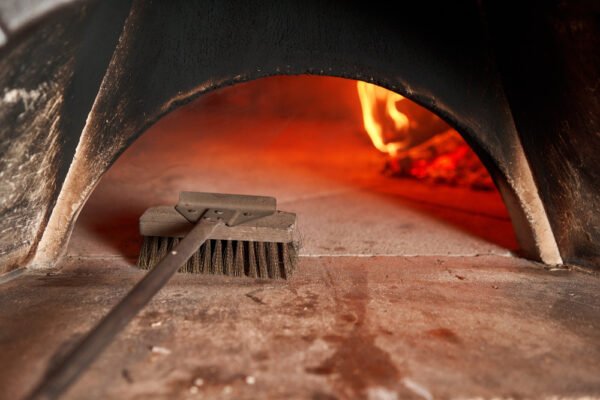
Slice of Life: How to Clean Your Pizza Oven

With sunny spells forecast for the UK across early Spring, many thoughts will turn to al fresco dining and gorging on home-cooked favourites in the garden.
Homemade pizza making became a particular feature of lockdown living with the outdoor pizza oven becoming the go-to outdoor gadget of the last few years.
The arrival of the warmer weather will also herald the arrival of cleaning equipment as pizza oven owners race to get their appliances back in tip top condition after being left to stand over winter.
We have worked with the team over at Flogas Shop to share the best way to clean your pizza oven to help you enjoy a slice of the good life this summer.
Turn up the heat
Many pizza oven owners testify to simply turning up the heat for 30 minutes to blast away any ingredients.
While this can be an effective method in the short term, it can lead to a build-up of soot and a thorough clean will be needed after a lengthy lay-off.
A built up of soot may also mean the oven doesn’t reach the same levels of heat – or worse, the pizza doesn’t taste as good. Follow these handy tips instead:
Cleaning the pizza stone
Once the stone has fully cooled off from usage, inspect its state thoroughly. Make sure to wipe down any cheese or sauces. Next, remove any excess food using a spatula but be careful not to scrape too vigorously as you may scratch the surface.
For spilt liquids or stubborn stains, attack with hot water and a scrubbing brush. Be careful not to use soap or other cleaning products as these could be absorbed by the stone and could transfer to your food when cooking.
For extra-resistant stains, mix a little baking soda with water until it forms a paste and apply to remove any tough mark. If this doesn’t work, then wipe clean, reapply and scrub again until stains are no more. Remember to wipe any baking soda traces clean after use.
Cleaning the outside of the pizza oven
How you clean the exterior of your pizza oven will be determined by the materials it is built from – likely brick / stone or stainless steel.
Stainless Steel
Stainless steel is common for showing smudges and fingerprints so you’ll want to rub down thoroughly with warm water after every use before buffing up nicely with a dry microfibre cloth. For a smear-free finish, use a dab of baby oil on a dry cloth and apply gently to the steel.
Brick / Stone
When first using your stone oven again after a lengthy lay-off, you will want to cure your oven for a few hours to get rid of any moisture. If the oven has been stood outside in the rain, you want to heat your oven at a lower temperature to prevent any cracks appearing.
Next brush down the outside with a wire brush and apply waterproof cover if oven is standing outside.
Prepare to power up
If your pizza oven is gas-powered, make sure your gas bottle is in full working order. Inspect the hose, regulator and rubber seals for any signs of damage – if these are dirty, clean them down so they’re ready to go. Soon, you’ll be cooking with gas!
If you haven’t used your gas bottle and pizza oven for a while, you might want to perform a leak test to make sure all parts are working safely. After connecting your regulator to the gas bottle, turn the gas on as normal and simply spray soapy water around any connections. Then, look for bubbles forming. If there are no bubbles wipe away excess liquid and continue to use your appliance as normal. If bubbles form, check all connections are tight (without overtightening or cutting into the hose) and retest.
How often should I clean my pizza oven?
If you’re regularly burning solid fuels such as charcoal or wood pellets, then your pizza oven should be cleaned often. Poor cleaning habits can detract from taste and compromise hygiene. Biomass boilers use wood pellets made from the waste materials from saw mills as a replacement for gas fuel for heating water and the building.
Look to clean the pizza stone at least once per week, however, make sure to sweep out any debris and brush your oven clean every few days. This includes checking the exhaust stack to ensure there’s no build-up.
As time progresses, an excess of soot inside the oven can mean the oven becomes less efficient and more inconsistent in its cooking times, so it’s important to stay on top of the cleaning.
With a little guidance, outdoor entertaining needn’t be stressful this summer.














































